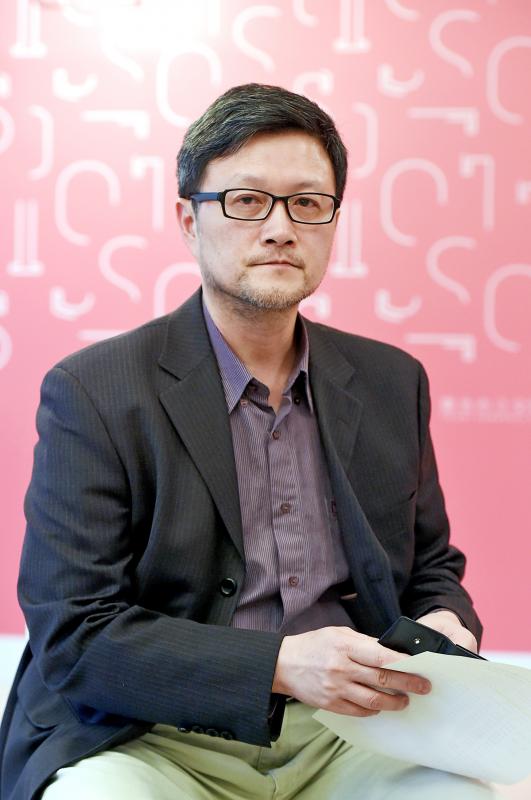Taipei Symphony Orchestra (TSO) director Ho Kang-kuo (何康國) has sparked controversy following accusations that he skipped rehearsals in Taiwan to lead a youth orchestra affiliated with the TSO to perform in China, with advertisements promoting the group as a Chinese entity.
The Chinese-language Apple Daily, citing an anonymous source, yesterday reported that Ho led a performance of TSO Youth — an orchestra of young Taiwanese musicians founded by the TSO in 2016 — in China on Oct. 19 last year, missing a TSO rehearsal in Taiwan.
Promotional materials in China called the group the “Taipei Symphony Orchestra, Taiwan, China,” the Apple Daily reported.

Photo: Sean Chao, Taipei Times
Yesterday, Ho said he attended the TSO dress rehearsal and concert, and had fully participated in previous rehearsals, as well as taking leave and using his own money to organize the contert in China.
TSO Youth and Ho said that they told event organizers to use “TSO Youth,” and that “TSO Youth” was used to introduce the group at the concert.
Chinese media might have added “Taiwan, China,” Ho added.
Chou Yang-ming (周揚明) made a donation of NT$570,000 to cover the travel expenses of the group members when she found out that they would be playing pieces composed by her father, Chou Lan-ping (周藍萍), Ho added.
The Taipei Department of Cultural Affairs said that it had received prior notice Ho’s trip to China with TSO Youth.
Additional reporting by Yang Hsin-hui

FALSE DOCUMENTS? Actor William Liao said he was ‘voluntarily cooperating’ with police after a suspect was accused of helping to produce false medical certificates Police yesterday questioned at least six entertainers amid allegations of evasion of compulsory military service, with Lee Chuan (李銓), a member of boy band Choc7 (超克7), and actor Daniel Chen (陳大天) among those summoned. The New Taipei City District Prosecutors’ Office in January launched an investigation into a group that was allegedly helping men dodge compulsory military service using falsified medical documents. Actor Darren Wang (王大陸) has been accused of being one of the group’s clients. As the investigation expanded, investigators at New Taipei City’s Yonghe Precinct said that other entertainers commissioned the group to obtain false documents. The main suspect, a man surnamed

The government is considering polices to increase rental subsidies for people living in social housing who get married and have children, Premier Cho Jung-tai (卓榮泰) said yesterday. During an interview with the Plain Law Movement (法律白話文) podcast, Cho said that housing prices cannot be brought down overnight without affecting banks and mortgages. Therefore, the government is focusing on providing more aid for young people by taking 3 to 5 percent of urban renewal projects and zone expropriations and using that land for social housing, he said. Single people living in social housing who get married and become parents could obtain 50 percent more

DEMOGRAPHICS: Robotics is the most promising answer to looming labor woes, the long-term care system and national contingency response, an official said Taiwan is to launch a five-year plan to boost the robotics industry in a bid to address labor shortages stemming from a declining and aging population, the Executive Yuan said yesterday. The government approved the initiative, dubbed the Smart Robotics Industry Promotion Plan, via executive order, senior officials told a post-Cabinet meeting news conference in Taipei. Taiwan’s population decline would strain the economy and the nation’s ability to care for vulnerable and elderly people, said Peter Hong (洪樂文), who heads the National Science and Technology Council’s (NSTC) Department of Engineering and Technologies. Projections show that the proportion of Taiwanese 65 or older would

Democracies must remain united in the face of a shifting geopolitical landscape, former president Tsai Ing-wen (蔡英文) told the Copenhagen Democracy Summit on Tuesday, while emphasizing the importance of Taiwan’s security to the world. “Taiwan’s security is essential to regional stability and to defending democratic values amid mounting authoritarianism,” Tsai said at the annual forum in the Danish capital. Noting a “new geopolitical landscape” in which global trade and security face “uncertainty and unpredictability,” Tsai said that democracies must remain united and be more committed to building up resilience together in the face of challenges. Resilience “allows us to absorb shocks, adapt under